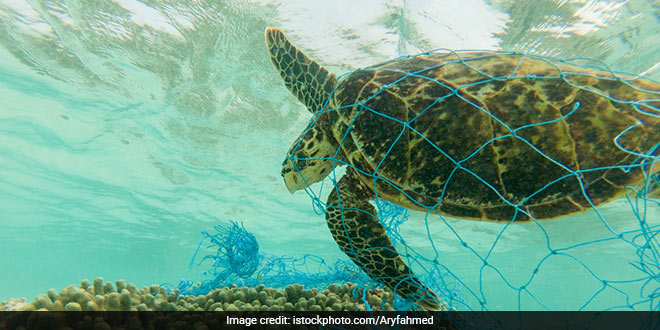London: Green turtles are more likely to swallow plastic that resembles their natural diet of sea grass, new research suggests. Published in the journal ‘Scientific Reports’, the study found that turtles strongly favour narrow lengths of plastic in natural colours like green and black, rather than the debris of other shapes and colours. The researchers examined the guts of turtles found washed up on beaches in Cyprus. Plastic was found in all turtles whose full gastrointestinal tract could be examined, with one found to contain 183 pieces.
Also Read: Plastic Pollution: Dead Whale In Philippines Ate 40 Kilogram Of Plastic
Researcher Emily Duncan from the University of Exeter in the United Kingdom (UK) said,
Sea turtles are primarily visual predators — able to choose foods by size and shape — and in this study we found strong evidence that green turtles favour plastic of certain sizes, shapes, and colours.
She further said,
Compared to a baseline of plastic debris on beaches, the plastic we found in these turtles suggests they favour threads and sheets that are black, clear or green. The sources of this plastic might include things like black bin bags, and fragments from items such as fishing rope and carrier bags.
Also Read: Whale Found Dead In Indonesia With 115 Plastic Cups In Stomach
The study found that smaller turtles tended to contain more plastic, possibly because they were less experienced and therefore more likely to eat the wrong food or because diet choices change with age and size.
Of the 34 turtles examined, the researchers were able to examine the full gastrointestinal tracts of 19. All of these turtles contained plastic, with the number of pieces ranging from three to 183. Brendan Godley, Professor at University of Exeter said,
Research like this helps us understand what sea turtles are eating, and whether certain kinds of plastic are being ingested more than others.
NDTV – Dettol Banega Swachh India campaign lends support to the Government of India’s Swachh Bharat Mission (SBM). Helmed by Campaign Ambassador Amitabh Bachchan, the campaign aims to spread awareness about hygiene and sanitation, the importance of building toilets and making India open defecation free (ODF) by October 2019, a target set by Prime Minister Narendra Modi, when he launched Swachh Bharat Abhiyan in 2014. Over the years, the campaign has widened its scope to cover issues like air pollution, waste management, plastic ban, manual scavenging and menstrual hygiene. The campaign has also focused extensively on marine pollution, clean Ganga Project and rejuvenation of Yamuna, two of India’s major river bodies.




























